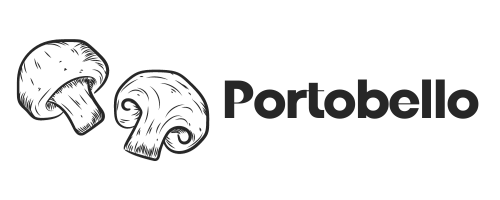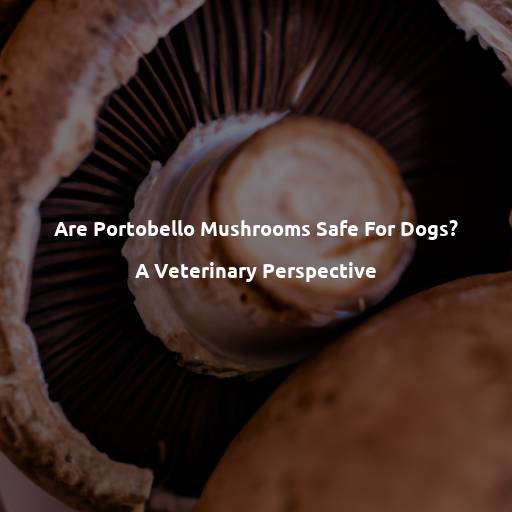Introduction: Exploring the Safety of Portobello Mushrooms for Dogs
When it comes to exploring the safety of portobello mushrooms for dogs, there are some important factors to consider. While portobello mushrooms can offer potential nutritional benefits to canines, there are also potential risks associated with feeding these mushrooms to your furry friends. In this section, we will delve into these aspects, providing valuable information to help ensure the well-being of your beloved pets. So, let’s dive in and examine the safety of portobello mushrooms for dogs.
Understanding Portobello Mushrooms: Nutritional Profile and Potential Benefits
Portobello mushrooms provide dogs with a variety of essential nutrients and potential health benefits. These mushrooms are low in calories and fat, making them a suitable addition to a canine’s diet. They are also a good source of fiber, which can improve digestive health and promote regular bowel movements in dogs. Additionally, portobello mushrooms contain various vitamins and minerals, such as potassium, phosphorus, and selenium, which support overall well-being.
One significant advantage of portobello mushrooms is their high antioxidant content. Antioxidants help reduce oxidative stress and inflammation in a dog’s body, potentially contributing to the prevention of chronic diseases and promoting a healthy immune system.
Moreover, portobello mushrooms contain certain compounds that may have anti-cancer properties. Research suggests that these mushrooms possess natural compounds like conjugated linoleic acid (CLA) and beta-glucans, which have shown promising results in inhibiting the growth and spread of cancer cells in animals.
However, it’s important to note that while portobello mushrooms can be beneficial for dogs, they should always be prepared and served in a dog-safe manner. Avoid using any seasonings, oils, or toppings that may be harmful to dogs. Moreover, it’s crucial to offer portobello mushrooms in moderation as part of a balanced diet, as excessive consumption may lead to digestive issues or other adverse effects.
If you’re unsure about whether portobello mushrooms are suitable for your dog, it’s best to consult with a veterinarian. They can evaluate your dog’s specific health needs and provide professional guidance on incorporating portobello mushrooms or other mushroom varieties into your dog’s diet safely and appropriately.
In conclusion, understanding the nutritional profile and potential benefits of portobello mushrooms for dogs is essential for responsible pet owners. While these mushrooms can offer various nutrients and potential health advantages, it’s crucial to exercise moderation and seek professional advice before introducing them into your dog’s diet. By providing a well-rounded and balanced diet, you can ensure your canine companion’s optimal health and well-being.
Potential Risks Associated with Feeding Portobello Mushrooms to Dogs
Feeding portobello mushrooms to dogs can pose potential risks that dog owners should be aware of. Although generally considered safe for human consumption, portobello mushrooms may have adverse effects on dogs due to their unique digestive system and metabolism. One of the primary risks associated with feeding portobello mushrooms to dogs is their ability to cause gastrointestinal upset. These mushrooms can be difficult for dogs to digest, leading to symptoms such as vomiting, diarrhea, and abdominal discomfort. Moreover, portobello mushrooms may contain toxic compounds, such as agaritine, that can be harmful to dogs when ingested in large amounts. These compounds can potentially damage a dog’s liver, leading to serious health issues. Additionally, the high fiber content in portobello mushrooms can cause digestive disturbances in some dogs, especially those with sensitive stomachs. It is crucial for dog owners to ensure that mushrooms, including portobellos, are thoroughly cooked before feeding them to their pets. Raw or undercooked mushrooms may contain harmful bacteria or parasites that can further exacerbate the risks. To avoid any potential risks, it is best to consult with a veterinarian before introducing portobello mushrooms or any new food into your dog’s diet. They can provide personalized advice based on your dog’s specific health needs, dietary restrictions, and potential allergies. The health and well-being of your canine companion should always be the top priority, and responsible pet owners should strive to provide a healthy and balanced diet to support their dog’s overall health.
Moderation is Key: Portobello Mushroom Guidelines for Dog Owners
Portobello mushrooms can be a healthy addition to your dog’s diet, but it’s important to follow some guidelines to ensure their safety and well-being. When it comes to feeding portobellos to your furry friend, moderation is key. Portobello mushrooms should only be given to dogs in small quantities and as an occasional treat rather than a regular part of their diet.
While portobellos offer various nutritional benefits, such as being low in fat, high in fiber, and rich in minerals like potassium and phosphorus, they also contain a compound called agaritine which can be toxic in large amounts. Therefore, it’s crucial to limit your dog’s intake of portobellos to minimize any potential risks.
To ensure safety, always cook the mushrooms thoroughly before feeding them to your dog. Cooking helps to break down agaritine and other potentially harmful substances, making the mushrooms safer for consumption. It’s also important to remove the stem and gills of the portobello mushroom, as these parts can be difficult for dogs to digest and may pose a choking hazard.
Additionally, observe your dog for any adverse reactions after consuming portobello mushrooms. If you notice any signs of digestive upset, such as vomiting, diarrhea, or stomach discomfort, discontinue feeding them mushrooms and consult your veterinarian for further guidance.
Remember, even though portobello mushrooms can offer some benefits to dogs when given in moderation, they should never replace a balanced and complete diet specifically formulated for their nutritional needs. Always prioritize their regular food and consult with your veterinarian before making any significant dietary changes.
By following these guidelines and being mindful of moderation, you can safely incorporate occasional portobello mushrooms into your dog’s diet while providing them with a diverse range of nutrients.
Safe Alternatives: Recommended Mushrooms for Dogs
When it comes to providing safe alternatives to portobello mushrooms for dogs, it’s important to consider mushrooms that are not only safe but also offer some nutritional benefits. While portobello mushrooms can be enjoyed by dogs in moderation, there are other mushrooms that may be a better choice for our furry friends. Here are some recommended mushrooms for dogs:
1. Button Mushrooms: Button mushrooms are a popular choice for dogs due to their mild flavor and soft texture. They are low in calories and rich in antioxidants, vitamins B and D, and minerals like selenium and potassium.
2. Shiitake Mushrooms: Shiitake mushrooms provide a meaty texture that dogs may find appealing. These mushrooms are a good source of protein, fiber, and various beneficial compounds like lentinan, which can support the immune system.
3. White Mushrooms: Also known as champignon mushrooms, white mushrooms are another safe option for dogs. They are low in calories and contain vitamins B6 and C, as well as minerals like potassium and phosphorus.
4. Maitake Mushrooms: Maitake mushrooms are highly nutritious and can provide additional health benefits for dogs. They are rich in vitamins B and D, as well as minerals like copper, zinc, and selenium. Maitake mushrooms also contain the compound beta-glucan, known for its immune-enhancing properties.
5. Oyster Mushrooms: Oyster mushrooms are not only safe for dogs, but they also offer a unique taste and texture. These mushrooms are low in calories and are a good source of protein, fiber, and several vitamins and minerals, including potassium and vitamin C.
While these mushrooms are generally safe for dogs, it’s crucial to introduce them gradually into their diet and monitor for any adverse reactions. Always consult with your veterinarian before adding any new food to your dog’s diet, including mushrooms. Remember, moderation is key when it comes to feeding mushrooms to your furry friend to ensure a healthy and balanced diet.
Consulting Your Veterinarian: Professional Advice for Feeding Portobello Mushrooms to Dogs
Consulting your veterinarian: professional advice for feeding portobello mushrooms to dogshile it is important to gather information about the safety of feeding portobello mushrooms to dogs, it is equally crucial to consult with a veterinarian before making any dietary changes for your canine companion. Your vet can provide professional advice and guidance based on your dog’s specific health needs and dietary requirements.
A veterinarian will be able to assess your dog’s overall health, existing medical conditions, and any potential allergies before giving the go-ahead to include portobello mushrooms in their diet. They can also offer insights into the appropriate portion sizes and frequency of feeding portobello mushrooms to ensure a balanced and healthy canine diet.
Furthermore, your veterinarian may provide valuable information regarding any specific risks or concerns associated with feeding portobello mushrooms to dogs. They can address any potential interactions with medications or underlying health issues that might be exacerbated by mushroom consumption.
Remember, every dog is unique, and what works for one may not work for another. Therefore, it is crucial to have an open and honest discussion with your vet to determine if portobello mushrooms are safe and suitable for your four-legged friend.
Ultimately, the professional advice and guidance of a veterinarian will help you make an informed decision about feeding portobello mushrooms to your dog and ensure that their diet remains healthy, balanced, and tailored to their specific needs.
Conclusion: Providing a Healthy and Balanced Diet for Your Canine
In conclusion, providing a healthy and balanced diet for your canine companion is crucial for their overall well-being. While portobello mushrooms can offer some nutritional benefits, it’s important to remember that moderation is key. Consult with a veterinarian before introducing portobello mushrooms or any new food into your dog’s diet to ensure it aligns with their specific health needs and dietary restrictions.
Remember that portobello mushrooms should never replace a balanced and complete diet specifically formulated for your dog’s nutritional needs. Prioritize their regular food and use portobellos as an occasional treat. Following these guidelines and being mindful of moderation will allow you to safely incorporate portobello mushrooms into your dog’s diet while still providing them with a diverse range of nutrients.
By always prioritizing your dog’s health and consulting with a veterinarian, you can ensure that their diet remains healthy, balanced, and tailored to their specific needs.

